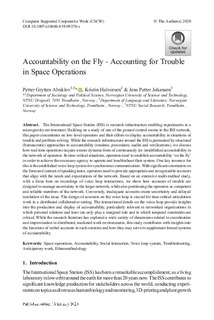| dc.contributor.author | Almklov, Petter Grytten | |
| dc.contributor.author | Halvorsen, Kristin | |
| dc.contributor.author | Johansen, Jens Petter Kirkhus | |
| dc.date.accessioned | 2020-02-05T12:33:53Z | |
| dc.date.available | 2020-02-05T12:33:53Z | |
| dc.date.created | 2020-01-20T15:40:30Z | |
| dc.date.issued | 2020 | |
| dc.identifier.citation | Computer Supported Cooperative Work (CSCW). 2020, . | nb_NO |
| dc.identifier.issn | 0925-9724 | |
| dc.identifier.uri | http://hdl.handle.net/11250/2639826 | |
| dc.description.abstract | The International Space Station (ISS) is research infrastructure enabling experiments in a microgravity environment. Building on a study of one of the ground control rooms in the ISS network, this paper concentrates on low-level operators and their efforts to display accountability in situations of trouble and problem solving. While the research infrastructure around the ISS is permeated by structural (bureaucratic) approaches to accountability (routines, procedures, audits and verifications), we discuss how real-time operations require a more dynamic form of continuously (re-)established accountability in the network of operators. In time-critical situations, operators need to establish accountability ‘on the fly’ in order to achieve the necessary agency to operate and troubleshoot their system. One key resource for this is the established voice loop system for synchronous communication. With significant constraints on the form and content of speaking turns, operators need to provide appropriate and recognizable accounts that align with the needs and expectations of the network. Based on an extensive multi-method study, with a focus here on recordings of voice loop interactions, we show how accounts of trouble are designed to manage uncertainty in the larger network, while also positioning the operators as competent and reliable members of the network. Conversely, inadequate accounts create uncertainty and delayed resolution of the issue. The design of accounts on the voice loop is crucial for time-critical articulation work in a distributed collaborative setting. The interactional details on the voice loop provide insights into the production and display of accountability, particularly relevant in networked organizations in which personal relations and trust can only play a marginal role and in which temporal constraints are critical. While the research literature has explored a wide variety of dimensions related to coordination and improvisation in distributed, mediated work environments, this study contributes with insights into the functions of verbal accounts in such contexts and how they may serve to supplement formal systems of accountability. | nb_NO |
| dc.language.iso | eng | nb_NO |
| dc.publisher | Springer Verlag | nb_NO |
| dc.rights | Navngivelse 4.0 Internasjonal | * |
| dc.rights.uri | http://creativecommons.org/licenses/by/4.0/deed.no | * |
| dc.title | Accountability on the Fly - Accounting for Trouble in Space Operations | nb_NO |
| dc.type | Journal article | nb_NO |
| dc.type | Peer reviewed | nb_NO |
| dc.description.version | publishedVersion | nb_NO |
| dc.source.pagenumber | 36 | nb_NO |
| dc.source.journal | Computer Supported Cooperative Work (CSCW) | nb_NO |
| dc.identifier.doi | 10.1007/s10606-019-09370-z | |
| dc.identifier.cristin | 1778198 | |
| dc.description.localcode | © The Author(s) 2020 Open Access This chapter is licensed under the terms of the Creative Commons Attribution 4.0 International License (http://creativecommons.org/licenses/by/4.0/), | nb_NO |
| cristin.unitcode | 194,67,25,0 | |
| cristin.unitcode | 194,62,60,0 | |
| cristin.unitname | Institutt for sosiologi og statsvitenskap | |
| cristin.unitname | Institutt for språk og litteratur | |
| cristin.ispublished | true | |
| cristin.fulltext | original | |
| cristin.qualitycode | 2 | |

